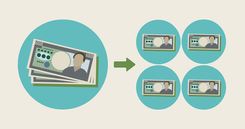Calculating a household budget can be complicated, but it is definitely a useful tool for keeping your finances in order. The key to calculating your budget is to have a record of your income and expenses. This will give you the information you need to start creating your budget.
Defining your financial goals
It is important to define your financial goals before calculating your household budget. This will help you maintain control over your finances by aligning your spending with your personal goals. Setting clear objectives will allow you to monitor your progress and also motivate you to achieve what you have set out to do.
Organizing your income and expenses
Organizing your income and expenses is of utmost importance in calculating your family budget. You can start by writing down all your sources of income, whether it is wages, pensions, allowances or other income. This will help you establish a baseline for your budget.
On the other hand, you should take into account fixed and variable expenses. Those fixed such as mortgage, rent, transportation, energy and water bills and taxes. On the other hand, variable expenses such as food, clothing and nights out are expenses that vary from month to month. By carefully calculating these amounts you will have a clear idea of what you are going to spend each month.
Building your budget
Building your budget: The first part of calculating a household budget is deciding what areas to spend on. This includes things like food, transportation, utilities and housing. Take into account all fixed and variable expenses necessary for your family's well-being.
Once you have set expenses at acceptable levels, it is time to start saving. Set a fixed amount to save and put it directly into your bank account each month. If possible, consider investing some of your earnings for a secure financial future.
Determining your savings
Establishing a household budget is an important part of managing your finances. Determining how much you can save will help you develop financial discipline and build your wealth.
To determine your savings, first determine your monthly fixed expenses such as rent, utilities, insurance and loan payments. Next, determine how much money is left over from your income after paying these fixed expenses.
Finally, consider the number of weeks in the month to calculate the percentage for your monthly savings. For example, if you have 4 weeks in a month, try to put away 25% of your remaining income each week to reach your monthly savings goal.
Maintaining your long-term budget
Maintaining a long-term budget is critical to meeting your family's financial goals. This means establishing a balanced budget that meets your income and expense needs over the long term. It is important to constantly monitor your spending to make sure you stay on budget. This will make it easier to achieve your desired financial goals, such as buying a home or arranging for a comfortable retirement.












